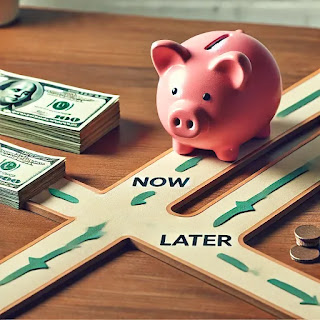Why hyperbolic discounting fascinates me
At a recent work event, I noticed something that reminded me why I became a behavioural neuroscientist: During a conversation in the morning, I asked a colleague about his evening plans -he mentioned hitting the gym as part of a long-term fitness program but was also open to joining us for drinks afterwards.
As the day progressed, something interesting happened. Despite his initial plan to go to the gym, by 4 pm, he was enjoying a glass of wine 🍷 An hour later, we were enjoying happy hour in a bar, and though he still talked about the gym, he ordered an old-fashioned (or two?)
By 8 pm, we found ourselves in a restaurant having a Korean dinner -not the lightest meal before a workout. I asked about the gym plans again, and though he seemed optimistic, his certainty wavered a bit. Finally, around 10 pm, he hinted he might hit the gym, but it was uncertain. No need to state that he didn’t go 😂
GeorgeAinslie experimentally discovered that for preference reversal to make sense, rewards must devalue hyperbolically, not linearly as economists believed. Economists typically used a discount function assuming a constant rate of time preference, where future rewards consistently hold less value than immediate ones, diminishing proportionally over time.
However, behavioural research, especially the work of psychologists like George Ainslie and Richard Herrnstein, revealed hyperbolic discounting, where the devaluation of future rewards isn't constant but changes significantly based on their temporal proximity. This discovery was ground-breaking, offering insights into why our preferences change over time and significantly impacting the work of Kahneman and Tversky.
It's unfortunate that George Ainslie's work isn't as recognized as it deserves. This blog honours his influential contributions, which inspired my pursuit of a PhD on the topic!
To avoid constant changes in our decisions, using tools like commitments or even small penalties can help us stay committed to our long-term plans. These simple strategies can keep us on track, steering us away from the temptation of instant rewards and helping us remain focused on our goals.
So, don’t fall into the trap of preference reversal like my colleague did. Stick with your long-term plans!




Comments
Post a Comment